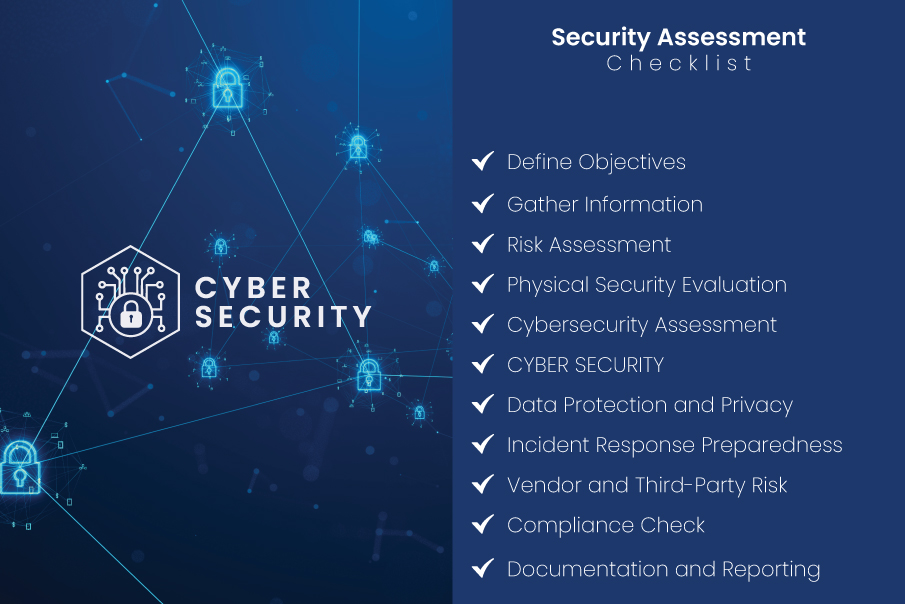In an era where digital threats are ever-looming, and physical security risks remain prevalent, safeguarding your business is not just a priority but a necessity. A comprehensive security assessment is crucial in understanding vulnerabilities and mitigating risks effectively. A professional security assessment checklist can be invaluable whether you’re a small startup or a large corporation.
Let’s delve into what such a checklist entails and why protecting your business is essential.
Understanding the Importance of Security Assessment
Before diving into the checklist itself, it’s vital to grasp why conducting a security assessment is indispensable for any business:
- Identifying Vulnerabilities: A security assessment helps pinpoint weaknesses in your organization’s security posture, whether in physical premises, digital infrastructure, or operational protocols.
- Mitigating Risks: By identifying vulnerabilities, you can take proactive measures to mitigate risks effectively, reducing the likelihood of security breaches or incidents.
- Compliance Requirements: Many industries have regulatory compliance standards that mandate regular security assessments. Meeting these requirements not only ensures legal compliance but also enhances overall security.
- Protecting Assets and Reputation: A breach in security can result in significant financial losses, damage to reputation, and loss of trust among customers. Conducting regular security assessments is a proactive approach to protect your assets and reputation.
The Professional Security Assessment Checklist

Now, let’s outline a comprehensive checklist for conducting a professional security assessment:
- Define Objectives: Clearly outline the goals and scope of the security assessment. Determine what security aspects you’ll evaluate, such as physical security, cybersecurity, or operational procedures.
- Gather Information: Collect relevant documentation, including security policies, network diagrams, access control lists, incident reports, and previous security assessments.
- Risk Assessment: Conduct a thorough risk assessment to identify potential threats, vulnerabilities, and their potential impact on the business. Use methodologies such as threat modelling and vulnerability scanning.
- Physical Security Evaluation:
- Assess access control mechanisms, including locks, alarms, and surveillance systems.
- Evaluate the physical layout of the premises for vulnerabilities such as blind spots or unsecured entry points.
- Review visitor management procedures and employee access protocols.
- Cybersecurity Assessment:
- Perform penetration testing to identify weaknesses in networks, systems, and applications.
- Review firewall configurations, antivirus software, and intrusion detection systems.
- Assess employee awareness of cybersecurity best practices through simulated phishing attacks or security awareness training.
- Data Protection and Privacy:
- Evaluate data handling procedures to ensure compliance with data protection regulations.
- Review encryption protocols for sensitive data both at rest and in transit.
- Assess procedures for data backup, recovery, and disposal.
- Incident Response Preparedness:
- Review incident response plans and procedures for different types of security incidents.
- Conduct tabletop exercises to simulate real-world security incidents and evaluate the effectiveness of response protocols.
- Vendor and Third-Party Risk Assessment:
- Assess the security posture of vendors and third-party service providers with access to sensitive data or systems.
- Review contracts and service level agreements to ensure they include adequate security provisions.
- Compliance Check:
- Evaluate the organization’s compliance with relevant industry standards and regulations such as GDPR, HIPAA, or PCI DSS.
- Identify any gaps and prioritize remediation efforts to ensure compliance.
- Documentation and Reporting:
- Document findings, including identified vulnerabilities, risks, and recommendations for mitigation.
- Prepare a comprehensive report outlining the security assessment results, including an executive summary for stakeholders.
Conclusion:
A professional security assessment checklist is fundamental for businesses seeking to safeguard their assets, data, and reputation.
Partnering with professionals can make all the difference in your journey to fortify your business’s security. Atlas Aegis stands as a beacon of expertise in security assessments, offering tailored solutions to meet your specific needs.
Our team of seasoned professionals brings years of experience and a meticulous approach to every evaluation, ensuring thoroughness and precision in identifying vulnerabilities and mitigating risks.
You opt for peace of mind and proactive protection against potential threats by choosing Atlas Aegis for your security assessment needs. Let us assist you in safeguarding your business, assets, and reputation, empowering you to focus on what truly matters: your core operations and growth.
Take the first step towards bolstering your business’s security today. Contact Atlas Aegis and schedule a consultation with our experts. We’ll craft a customized security assessment strategy to fortify your defences and safeguard your future. Don’t wait until it’s too late—invest in security with Atlas Aegis now.





